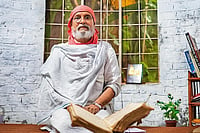Jack Sim founded the World Toilet Organization (WTO) over two decades ago, it was the desire to address neglected issues and be of service to others. While talking about this motivation, he emphasises on the urgent need to address sanitation issues and transform toilet hygiene into a global priority.
Sim’s achievements are centred around empowering others to improve sanitation worldwide. By harnessing the power of media to generate demand for toilets, he has translated these demands into political actions, driving policy changes that enhance the quality of life for millions.
His groundbreaking initiative, the UN World Toilet Day on November 19, has legitimised the once-unspoken agenda of sanitation on the global stage. Sim’s unwavering commitment to breaking taboos and simplifying sanitation narratives has reshaped the discourse.
Sim insists that his work is not about earning laurels for WTO, but about seeing solutions happen. Excerpts:
What inspired you to set up WTO over 20 years ago?
After I attained financial independence, I realised that time is the real currency of life. When time runs out, life ends. So I cannot waste time, and the best use of time is service. The best benefit is for neglected issues that nobody wants to address. That is how toilet became my mission.
What, according to you, are your main achievements?
My main achievement is to facilitate the achievement of others in their actions to improve sanitation. I do this by generating massive demand for toilets through media stories. These demands became political votes and drove politicians to make policies to improve the quality of life for their people.
I created the UN World Toilet Day on November 19 to legitimise this “unspeakable” agenda. Had the WTO not existed, the world would still have called sanitation a water agenda, and water would continue to overshadow sanitation as an issue.
In a world where agendas compete for attention, we have to orchestrate multi-stakeholders to prioritise sanitation continuously and to put sanitation on centre stage.
The general perception is that it is a problem specific to India. What is your experience?
Poor sanitation is a global problem, especially in the global south. India had the most significant share of its population size. But I am impressed by Prime Minister Modi’s relentless drive for solving this crisis. I am also glad that there are so many champions coming out from India.
I think the ascension of Bharat will be paired with the rise of good sanitation conditions, and eventually, all Indians will have clean toilets everywhere at any time of need.
Is it so pervasive that you had to scale up in 50-odd countries?
Today, the speed of storytelling is ubiquitous and omnipresent. My role is to craft stories that incentivise stakeholders in their respective interests.
This work is not about claiming credits for the WTO. It is about seeing the solutions happen. When it happens, that is our satisfaction.
Are there any good practices in India that can be replicated in other countries?
Anal washing is cleaner than wiping. However, anal washing has to be accompanied by hand hygiene and safe discharge of water.
I can see the world moving towards anal washing, especially as Japanese bidet toilets are getting more popular.

How do you fund your work?
The WTO is a frugal entity. We have a minimal staff, and I have been working full-time for free for the last 20-plus years. We welcome all donations from anyone. Corporate sponsorship and donations are the primary revenue. Another source is the hosting fees for our annual World Toilet Summit paid by governments to us.
What is your sense of the sanitation situation in India?
India had the biggest sanitation crisis and a massively growing population. But it was fortunate to have many national champions in sanitation, from Mahatma Gandhi to Prime Minister Narendra Modi. These champions helped mitigate this sanitation challenge significantly.
Mahatma Gandhi said, “Sanitation is more important than independence”. He made cleanliness and sanitation an integral part of the way of living. His dream was to deliver total sanitation for all. He believed it is essential for everyone to learn about cleanliness, hygiene, sanitation. Though he could not achieve his dream of total sanitation, his key message for sanitation inspired future leaders into action as they read about his thoughts. With such shining champions, India transformed its sanitation crisis into a citizens’ movement, where all sectors took ownership of the challenge to work together for holistic system change.
If other countries with sanitation challenges find such local champions, they can similarly achieve excellent results like India.
How has India’s toilet landscape changed?
When Prime Minister Modi was sworn in in 2014, more than 600 million people practised open defecation in India. That was half the total population and double the number of people practising open defecation in the next 18 developing countries combined.
He launched a nationwide cleanliness campaign called Swachh Bharat Mission to provide sanitation facilities to every family, including toilets, solid and liquid waste disposal systems, village cleanliness and safe and adequate drinking water supply. In 2019, he declared India open defecation-free with the completion of 100 million toilets as a tribute to Mahatma Gandhi on his 150th birth anniversary.
India has embraced a scientific approach to address the water sanitation and hygiene challenges, setting a commendable example for other nations. The Indian model stands as a compelling case study, offering valuable insights and strategies that can be adopted worldwide to make lasting improvements in sanitation and public health.
How will you sum up your work in India?
The persistence of manual scavenging as an invisible socio-economic reality in India is incompatible with the country’s development trajectory. Together with the World Toilet Organization, our partner, Reckitt recognised the urgent need to address the rehabilitation of sanitation workers engaged in manual scavenging and established the Harpic World Toilet College India to tackle this issue and enhance the livelihoods, health and safety of these workers by eradicating the inhumane hazards associated with their work. This initiative is dedicated to providing dignified livelihood opportunities for sanitation workers across India. Over time, the Harpic World Toilet College India has expanded from its initial unit in Aurangabad to establishing 15 branches. To date, it has successfully trained and placed a total of 75,000 professionally skilled sanitation workers. Now, the World Toilet Organization plans to expand the World Toilet College to other parts of the world.
What are the challenges?
While hardware like twin-pit toilets was built, behavioural training has to be taught to ensure that the open defecation-free behaviours are sustained. To achieve that, the mission is now moving towards the next phase to reinforce open defecation-free behaviours and focus on providing interventions for the safe management of solid and liquid waste in villages.


























